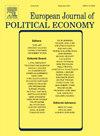收入不平等关系中的制度异质性和模型不确定性
IF 2.4
3区 经济学
Q2 ECONOMICS
引用次数: 0
摘要
本研究以政治体制为核心,重新审视了收入不平等的驱动因素。我们采用多维制度方法,从治理、政治自由、政治分裂和政治规模等方面对政治制度进行定义。我们将政治体制分解为不同的要素,并为每个维度提供可用的替代指标,从而对政治体制的作用进行了广泛的实证分析。考虑到文献中关于模型选择的困难以及缺乏共识和清晰度,我们采用了模型平均法来处理影响制度作用的模型不确定性和模型规范问题。我们将俱乐部趋同分析(一种根据国家长期收入轨迹进行聚类的机制)与贝叶斯模型平均法(BMA)相结合,从大量潜在决定因素中确定影响不平等的最重要变量,并根据每个同质国家的发展路径进行聚类。我们的研究结果表明,无论经济发展模式如何不同,收入不平等的驱动因素并不相同,在政治体制与收入不平等之间并不存在 "一刀切 "的政策规定。本文章由计算机程序翻译,如有差异,请以英文原文为准。
Heterogeneity of institutions and model uncertainty in the income inequality nexus
This study revisits the drivers of income inequality with political institutions at the core. We take a multidimensional institutional approach by defining political institutions in terms of governance, political freedom, political fragmentation and political scale. We carry out an extensive empirical analysis of the role of political institutions by decomposing it into distinct elements and providing available proxies for each dimension. Considering the difficulty and the lack of consensus and clarity regarding model selection in the literature, we follow a model averaging methodology to deal with the issue of model uncertainty and model specification that impacts the role of institutions. We combine an analysis of club convergence, a clustering mechanism according to the long term income trajectories of the countries, with Bayesian Model Averaging (BMA) to determine the most important variables that affect inequality out of a large set of potential determinants for each homogeneous country clusters in terms of their development path. Our results show that drivers of income inequality do not act the same irrespective of different economic development patterns and that there is no “one size fits all” policy prescription that links political institutions and income inequality.
求助全文
通过发布文献求助,成功后即可免费获取论文全文。
去求助
来源期刊

European Journal of Political Economy
Multiple-
CiteScore
3.40
自引率
10.00%
发文量
106
期刊介绍:
The aim of the European Journal of Political Economy is to disseminate original theoretical and empirical research on economic phenomena within a scope that encompasses collective decision making, political behavior, and the role of institutions. Contributions are invited from the international community of researchers. Manuscripts must be published in English. Starting 2008, the European Journal of Political Economy is indexed in the Social Sciences Citation Index published by Thomson Scientific (formerly ISI).
 求助内容:
求助内容: 应助结果提醒方式:
应助结果提醒方式:


